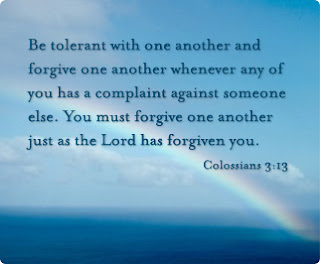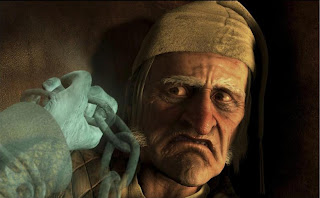Forgiveness

Some thoughts about forgiveness. I received a short booklet on this topic in the mail this week, and I thought it was particularly relevant to some things going on in my life at the moment.
(a) Sometimes it's not forgiveness, but understanding.
(b) Forgiveness should be humble, not self-righteous; restorative, not punitive.
(c) Forgiveness only counts when its tough.
Forgiveness is only relevant when the matter concerns something unequivocal. It's not applicable when we simply disagree with one another - sometimes we have different points of view, and then what is needed is understanding, not forgiveness. I think it's easy to forget this. People have expectations of one another, and sometimes we fail each other. It seems like we need to forgive the person who has not met our expectations, but actually what is needed is for us to understand that person better. It might be an expectation of gratefulness, or of companionship, or even material needs. If someone fails to live up to our expectations, we think that person has wronged us, which then leads us to think we need to forgive that person for wronging us. But sometimes, we just need to understand that person's situation better.
That isn't to say that failing to meet expectations is never "wrong". In fact, it is ABSOLUTELY CRITICAL that we denounce a wrong when it is patently wrong. For example, we expect our churches and pastors to be responsible stewards of the church's resources and caring shepherds for the flock. Suppose they fail us (which is certainly one possibility arising out of the recent initiative by the Commissioner of Charities to review religious organisations' charitable practices). Sure, we need to understand why there was a failing. Maybe there were good reasons. But if there aren't, then certainly that failure to meet expectations could reasonably be construed as a "wrong".
Perhaps it's unfortunate, but we do hold persons in authority/responsible positions to higher standards than we do ourselves. We expect our parents to be great. We expect our teachers to be role models. We expect our bosses to lead by example. We expect our pastors to be poor (though I don't understand why, since we don't expect it of ourselves). We expect our spouses to be happening/caring/hardworking etc. And we expect Christians to be good.
Fair or unfair, with authority/responsibility comes expectation. What do we do then, when people fail us? From my recent experience, I've done some things right and some things wrong. I think it is important to meet the person who has failed us with humility. Most times, we are not in that person's shoes. Who knows how we ourselves would have reacted in his situation? Take the plank out of our own eye first. In the past week, I've approached one situation with that humility, and I think that was really useful. In another situation, I went in full of indignance, and although it felt good to get everything off my chest, that turned out really badly. This is especially because self-righteous forgiveness isn't really forgiveness at all, since it focuses on yourself rather than the other party. I think this is symptomatic of our belief that forgiveness is good for the forgiver. It's true that forgiveness is good for the forgiver, but sometimes we focus too much on that and lose sight of the purpose of forgiveness in the first place. To that end, forgiveness is restorative - it recognises the wrong (and this is absolutely crucial, otherwise it's not forgiveness but pandering), but it also brings that person back into favour, and does not seek to punish that person further with guilt.
One final thing. I think it is tempting, in any given situation, to say, "if it had been a small thing, I could have forgiven him, but I cannot forgive him for doing that!" This essentially says that the wrong is too big to forgive. But really, if you think about it, forgiveness really only counts when the thing to be forgiven is pretty much unforgivable. Anyone can forgive a small thing. It's when the big thing comes along that your willingness to forgive really counts.
Make your life count. Start today.
(a) Sometimes it's not forgiveness, but understanding.
(b) Forgiveness should be humble, not self-righteous; restorative, not punitive.
(c) Forgiveness only counts when its tough.
Forgiveness is only relevant when the matter concerns something unequivocal. It's not applicable when we simply disagree with one another - sometimes we have different points of view, and then what is needed is understanding, not forgiveness. I think it's easy to forget this. People have expectations of one another, and sometimes we fail each other. It seems like we need to forgive the person who has not met our expectations, but actually what is needed is for us to understand that person better. It might be an expectation of gratefulness, or of companionship, or even material needs. If someone fails to live up to our expectations, we think that person has wronged us, which then leads us to think we need to forgive that person for wronging us. But sometimes, we just need to understand that person's situation better.
That isn't to say that failing to meet expectations is never "wrong". In fact, it is ABSOLUTELY CRITICAL that we denounce a wrong when it is patently wrong. For example, we expect our churches and pastors to be responsible stewards of the church's resources and caring shepherds for the flock. Suppose they fail us (which is certainly one possibility arising out of the recent initiative by the Commissioner of Charities to review religious organisations' charitable practices). Sure, we need to understand why there was a failing. Maybe there were good reasons. But if there aren't, then certainly that failure to meet expectations could reasonably be construed as a "wrong".
Perhaps it's unfortunate, but we do hold persons in authority/responsible positions to higher standards than we do ourselves. We expect our parents to be great. We expect our teachers to be role models. We expect our bosses to lead by example. We expect our pastors to be poor (though I don't understand why, since we don't expect it of ourselves). We expect our spouses to be happening/caring/hardworking etc. And we expect Christians to be good.
Fair or unfair, with authority/responsibility comes expectation. What do we do then, when people fail us? From my recent experience, I've done some things right and some things wrong. I think it is important to meet the person who has failed us with humility. Most times, we are not in that person's shoes. Who knows how we ourselves would have reacted in his situation? Take the plank out of our own eye first. In the past week, I've approached one situation with that humility, and I think that was really useful. In another situation, I went in full of indignance, and although it felt good to get everything off my chest, that turned out really badly. This is especially because self-righteous forgiveness isn't really forgiveness at all, since it focuses on yourself rather than the other party. I think this is symptomatic of our belief that forgiveness is good for the forgiver. It's true that forgiveness is good for the forgiver, but sometimes we focus too much on that and lose sight of the purpose of forgiveness in the first place. To that end, forgiveness is restorative - it recognises the wrong (and this is absolutely crucial, otherwise it's not forgiveness but pandering), but it also brings that person back into favour, and does not seek to punish that person further with guilt.
One final thing. I think it is tempting, in any given situation, to say, "if it had been a small thing, I could have forgiven him, but I cannot forgive him for doing that!" This essentially says that the wrong is too big to forgive. But really, if you think about it, forgiveness really only counts when the thing to be forgiven is pretty much unforgivable. Anyone can forgive a small thing. It's when the big thing comes along that your willingness to forgive really counts.
Make your life count. Start today.



Comments